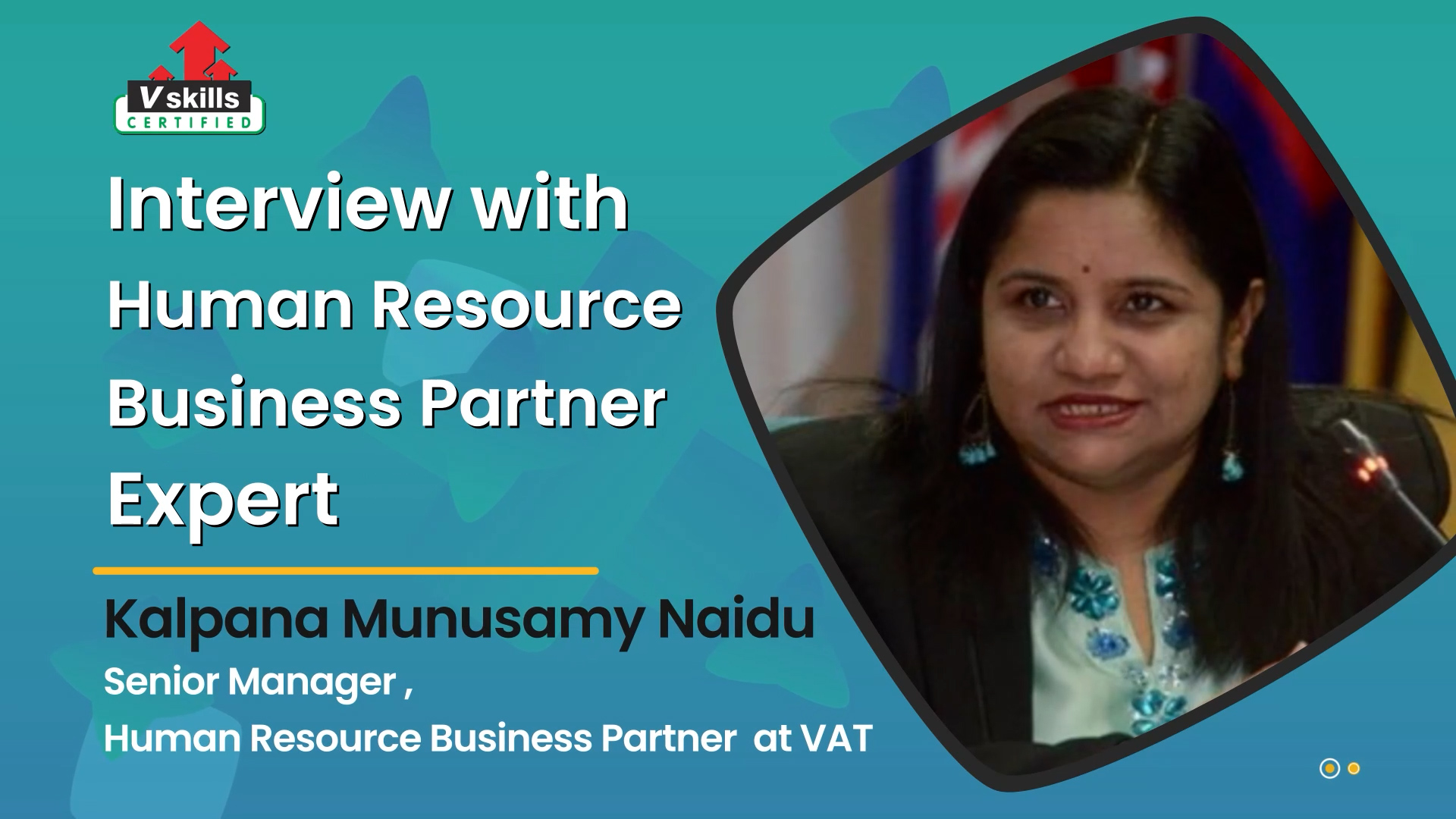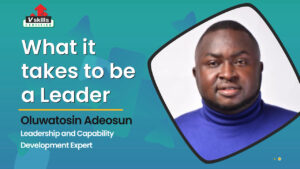HR Business Partners (HRBP) are responsible to work with teams, managers and key stakeholders for building an organisation and people capability, and shape and implement effective people strategies and activities within the organisation. They are specialized human resource professionals who work directly with an organization’s senior leadership for developing and directing HR goals that closely support organizational goals.
Let us listen to Ms. Kalpana Munusamy Naidu, a highly energized Human Resource Partner with twenty years of progressive experience and who has worked for several established organizations. Currently, she holds a position as a Senior Manager and HR Business Partner (HRBP) in her corporate career. Kalpana has acquired tremendous experience in people and organizational development at both operational and strategic levels throughout her career. She is a strong leader, major contributor and proactive player in achieving an organization’s overall objective.
Apart from her career role, she was involved in training & development, and agency coaching for recruitment and productivity. She develops course modules, HR policies and procedures and delivers training to various prestigious organizations. She is a highly experienced consultant and facilitator and works closely with Women NGOs and children and is committed to a personal mission of “empowering people”. She was instrumental in many projects and has worked with many organizations.
1. Can you share about your professional journey?
Answer: Let me start with my secondary school. Actually, I completed my higher secondary in a science medium. Then I went to a local University with a major in accounting. Those were my starting days. So everything was going well, I had an enjoyable University life as many of us. And things changed when I did my internship. I did my internship one in the Government sector and one in the banking sector part of my cost requirement. So during my internship in the accounting department, I realized this line doesn’t suit me, that’s not me. I cannot work behind the scene with the data.
So that was the time I realized I was very much people-oriented. After my graduation, I slowly looked for a line which suit my nature. So I started my career in payroll which was my first job in a logistic Industry. Payroll, admin and slowly to HR. So almost 20 years and now more than 20 years I never turned back. So HR has been my profession over the years. So that was my journey. Today HR is not only professional, it’s my passion.
2. What are the opportunities available in the HR field?
Answer: HR is very wide. It depends on the needs. So let’s say a young graduate joins a working firm, it depends on the interest and needs. So it can vary, you can actually do payroll, take employee data, system entry, and if interested in analysis you can do data analysis. It’s actually wide and depends upon a person’s goals and ambitions and where you want to actually be in life. Some HRs in in consultation services and work with agencies, it’s actually a wide spectrum that could be covered.
One of the important elements is compliance local, understanding the local law and human law. This is the area of focus. If someone is really interested in complying with these procedures, so it can actually take them to hire levels in HR.
3. How would you differentiate the roles of HR Business Partner and HR Specialist?
Answer: Many years ago, traditional HR, people always think of manual work like filing employee data, some sort of legal compliance. But the scope and need evolved over the years, depending upon business needs. So if you ask me, specialist, it then depends on organization. May be for big companies, we have HR specialist. HR specialist is someone who goes really in-depth. So let’s a recruitment person, if he’s is recruitment specialist, he is a person who can actually do A-Z in recruitment person, they know where to post the vacancy, how to shortlist the candidate, determining certain skills by just looking at CV, all these need to be on top of the market, know business and really in depth of knowledge.
HR specialist can be in many forms like total rewards, recruitment like any scope where they go in depth where they have many years of experience in that particular field. When I come to HR business partner, it is the one who closely works with the business. So they are the business partner. They need to understand overall business requirements, goal objective and from their they align the specialist. If it’s a big organization, HR business will be fronting the customer or client. From their they’ll align the specialist, recruitment, total reward, payroll.
In small firms, HR business can pay multiple roles. They can be a specialist as-well-as the business partner. So it depends on the business nature and how big is the organization, so these roles can vary.
4. How do you work with department managers on developing a plan to hire the right people?
Answer: Hiring is not about the candidate. It is also about finding the right fit and business continuity. So getting the right people in the organization, fitting them into the culture, and training them is like a culture free process. So when you hire someone, suppose I need to hire 100 engineers in manufacturing, I need to understand what is the business and why I need that much hiring. What is the background needed, understanding of the job description and what skills do I need to look into while hiring? So all these things are a package when you hire people.
So you need to understand the business goals, short-term and long-term business growth, and objectives. Once you have that only then you can actually be hiring the right people. Then you can with the recruitment team, hiring the right candidate, looking at skills, and nowadays there is a lot of skill assessment la ike behavioural test which can be actually assisting in hiring the right fit. It’s not about hiring alone, once you are on board, it’s about training for 30 days and the first 60 days the 90 days of training and also bringing them into the organizational structure.
Also, give them right mentor so that they can become a big family of that organization. This is very important in any hiring process.
5. What are the 5 most important skills required to become HRBP?
Answer: Firstly, I would say you need to speak the business language. You need to understand the business, the firm or the organization you are working in nature, the product solution is very important. Without knowing that you can’t proceed So you need to know short-term and long-term goals. You need to closely work with the business group. So firstly, is business language and knowledge. Secondly, in my opinion, HRPB must be a problem solver. So your business will come to you, management will come to you, and people will come to you. So you need to cope with them by solving issues, and looking at the overall strategy and workplace issues.
HRPB must also be a risk taker and must have courage. So it’s not every time you say yes, sometimes you need to follow compliance, and when you say No you should be, you must come up with solutions, and ideas. So I think it is one of the important characteristics of HRPB. Definitely, being digital. Since we are talking about digitalization, we are dealing with Millenials, talking about generations Y and Z. So you need to look at how much could you simplify it and automate the process.
So HR needs to think about how can he simplify the process and you need to have the curiosity to learn. Learning, empathy and the most important thing is the human element because you are dealing with people. So human element where you can actually do the networking, talk. If anyone can focus and improve these things, they can take up HRPB’s next level.
6. What advice would you give to our viewers who wish to do work as an HRBP?
Answer: If you are a young graduate and starting as a fresher, my recommendation would be please expose yourself. Learn as much as you can. Get to know the people, let’s suppose you are joining the HR team, don’t limit yourself just be in HR. So you should not just come at 8 o’clock and go back at 5 o’clock. Join activities and engage in knowing people. Involvement in projects actually gives networking and a base for knowing people and slowly you can go in-depth. So the fundamental of HR is knowing policy and procedure, it must on your fingertips.
Then you can able to advise and guide the team. Then understanding company policy, guidance, procedure, the local employee act and governance will help out. Also, they need to have their own short-term and long-term goal of what they want to achieve, from there they can actually grow in depth in the HR function. My advice would be to go explore things and yourself and have fun while working in the HR department.
7. What is the quotation you live by your life?
Answer: I believe in smiles. When I say smile, in my opinion, it’s the gesture where your network or bonding starts. It is very important as you are always surrounded by people and it’s always about people. Smile for me is you’ll see miracles every day in your life. So by doing your work with dedication, I believe you can go very high in your career life. So put on the hard work and dedication, give your 100%, and then the final output will always be there.




